|
Prince Charles explains 'pebble theatre'.
|
PEBBLE
|
|
Don Pierson [right] explains how a young Prince Charles made a request to join the Radio London fan club. |
|
|
Prince Charles explains 'pebble theatre'.
|
PEBBLE
|
|
Don Pierson [right] explains how a young Prince Charles made a request to join the Radio London fan club. |
|
|
In 2002, the book 'Radio Man' cost £92,355 to produce in the name of the prestigious Institute for Electrical Engineers (IEE), as a means of documenting a recreated history of Charles Orr Stanley; his son John Stanley, and their management of the Pye Group of Companies based in Cambridge, England. 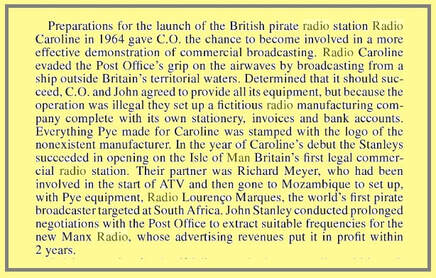 This book of 357 pages was published upon instructions of Nicholas Stanley. He created the Stanley Foundation for this purpose and it cost £92,355 to produce. That, is a lot of money, and it is especially true since that book does not tell the truth, it covers-up the truth. Nicholas is the son of John Stanley, and the grandson of Charles Orr, and it was Nicholas who hired Mark Frankland, academically accredited journalist for the 'Observer' newspaper and published author; with Gordon Busey, as a consulting technical writer. On page 276, and in one paragraph [above left], details of a conspiracy to evade the aims of the Conservative British government were set in motion by Nicholas Stanley's grandfather Charles, and his father John. Nicholas' book claims that they did this in order to introduce commercial radio from a broadcasting ship outside of UK territorial waters. That station was called Radio Caroline. According to this same paragraph, that event implies that the beginning of Radio Caroline paralleled the establishment of the "first legal commercial radio station" on the Isle of Man called Manx Radio. However, the history of Manx Radio includes the aborted attempt to begin broadcasting on the Isle of Man with a station called 'Radio Manx', and the two ventures are not the same, although there is an overlapping history of events concerning both operations. But this paragraph also contains a series of words which are extremely confusing because they are known to contradict facts in evidence:  According to this excerpt [shown right] and taken from the same text in that paragraph, it was the two Stanleys led by Charles Orr and supported by his son John, who were "determined" that Radio Caroline "should succeed". But why? What was their motive? The plethora of books that have been published to date on this subject generally ignore the claims made about Pye, even though 'Radio Man' was published in 2002, and books by Adrian Johns (2012); Ray Clark (2014); Brian Lister (2017) and Paul Rusling (2019) were all published after this date. But that list is not a complete list by any means, there are many others such as the book by Keith Skues (2009 and later) which have also appeared since 'Radio Man'. Yet none of the authors became troubled by the text on page 276 in that lone paragraph. Maybe these authors did not know about this prestigious publisher called the Institute of Electrical Engineers (IEE), who stated on the cover of this book that it was published as part of their 'History of Technology Series 30', or maybe this did but they did not know what to make of their book. Rusling seems to fall into this category because while he 'lifted' unaccredited illustrations and information from 'Radio Man', his references are a such a scrambled mess that he does not refer to the book itself. On the other hand, because Rusling was on the mailing list of the 'Caroline Investigation' newsletter, it was easier for him to 'lift' his information from that source. He certainly did not bother to go back and perform his own research, and thus he avoided the problem that arose for 'The Trio' during 2014 at Burntisland. So how does Paul Rusling overcome this problem? The answer is that he reverted to quoting books with publication dates earlier than 2002 when 'Radio Man' was published. The first book he cites is the 1967 commissioned book that was written by John Venmore-Rowland who wrote other books that same year about aspects of life in the county of Suffolk, England. That book is based upon a Brief originally written on behalf of the latter management of the Radio Caroline financial interests, in a vain attempt to sway Members of Parliament into not voting for the Marine Offences Bill which became law in 1967. To do this, the interests of Pye are omitted and replaced by the introduction of Arthur Carrington who was a TV studio camera manager; but technical claims were attributed to him that rightfully belonged to the Pye Group of companies, and which are documented with a supporting photograph and illustration (pages 259-260) in the 'Radio Man' book, which at the time, had not been published. The second book that Rusling reverted to using was Ian Ross' book 'Rocking the Boat' that was published in 1990 by Heinemann in London. The story behind that book also holds many secrets and 'The Trio' had to hire a private detective to discover what they were! I will come to that story a little later on because it is also a part of the very complicated story which has never been even hinted at before (not even by Rusling!), that blows the lid off so many myths about the creation of Radio Caroline in 1964. But it is Ross' book which invents a tale about his father, and who he says Ronan O'Rahilly called 'Jimmy'. It is that tale which further allows for the invention of a series of false links that lead to Jocelyn Stevens via John Sheffield. In his book, Ian Ross writes a story that is a work of total fiction more than it is a work of roman-a-clef, because that formula is supposed to be a recital of actual events that have been slightly concealed, but which are discernible as to their actual validity. Not so with the Ian Ross book. It is fiction very loosely based upon the advent of Radio Caroline which Ian Ross calls 'Radio Camelot' in an attempt to introduce the O'Rahilly mythology about his love for all things Kennedy. In other words it is a hoax. While that pile of nonsense is enough to confuse everyone, Rusling also dipped into a third source from the 'Caroline Investigation' newsletter and again he refuses to do any research so he lifts illustrations from the newsletter (without accreditation), while avoiding the original source which is 'Inside the National Enquirer' by George Bernard published in 1977 by Ashley Books in the USA. Now if you flip open to page 112 of Rusling's rubbish, you read that "George Bernard was a Brit", except that he was a U.S. citizen and had no connection to the U.K., apart from a link via his partner. But that is also another major story, which although Rusling has again taken without permission a lot of material from the 'Caroline Investigation' newsletter, he has scrambled that data so badly that if you accept what he has written, you miss the entire story! Rusling does the same thing with his mention of Garner Ted Armstrong on page 83. Rusling has no idea of how any of the key components of the story fit together. Rusling is a "smash-and-grab" thief who thinks that he can steal intellectual property at whim, and get away with it. But he not only steals from sources which paid to gather the information, but he then swindles his readers with such drivel that they are left more confused than ever before after reading my words. So how does Rusling dig himself out of the pit that he has created? He resorts to quoting Oonagh Leigh who he only names as Oonagh Huggard. Oonagh is Rusling's substitute for Ronan O'Rahilly who did not have access to. But Oonagh was only able to spin from memory a very vague tale that is unsupported by the facts, about how Ronan O'Rahilly supposedly got involved with offshore radio. Rusling also reverts to the 'Jimmy Ross' myth invented by Ian Ross in 1990, and this is how Paul Rusling tries to con his readers by relating a story that is based upon nothing more than the scrambled lack of reasoned thoughts coming out of his head: Page 54: "Several other high net worth individuals invested what they thought of as 'racing money' for this 'bit of a punt' as John Sheffield called it to the many investors he advised. Among these was the Stanley family who were already investors in Radio Atlanta and who had plans for their own Pye company to set up over a hundred local radio stations. The intent was that the radio ships would force the government to negate the need for offshore radio by licensing local commercial stations." Not one word of what Rusling has fleeced his paid readers to read is true! That is fraud because Rusling knew that what he was selling to his readers was a lie! Paul Rusling was on the mailing list of the 'Caroline Investigation' newsletter that attempted to hold a symposium along academic lines. Rusling does not study and he has turned his nose up at academia! Not only that, but the Stanleys had nothing to do with John Sheffield and Rusling's claims that the Stanleys invested in Radio Atlanta is also untrue. Rusling did his best in his absurd 'bible' to resurrect the 'Jimmy Ross' myth, but 'Jimmy Ross' did not exist. It was not the Stanleys who were investing in Allan Crawford's 'Radio Atlanta', they were the people behind Radio Caroline., because the Stanleys were the people who were "determined that (Radio Caroline) should succeed." ('Radio Man', page 276.) Rusling lied, but 'Radio Man' does not tell the truth either! I can prove it! You will have to be patient because I am going to treat this proof as if I am presenting it to a court of law and not on a blog! In a court of law a judge will require that evidence that is introduced into a case must be preceded by a 'foundation' of factual evidence. You cannot leap-frog over evidentiary facts, they must follow in order on a linked chain, and all links must be documented. I am going to do my very best to follow those standards. This may slow things down, but I am not writing a novel. So let us take a closer look at those words: "a fictitious radio manufacturing company" and that "everything Pye made for Caroline was stamped with the logo of the nonexistent manufacturer." The key words being "fictitious"; "manufacturing"; "made" and "nonexistent manufacturer." The problem that immediately arises for all of the many people who had been on board the mv Fredericia (ex-Caroline) is that all of the main transmitting and broadcasting equipment that was loaded on board that ship came from the United States of America. None of it was made by a Pye related company, and all of the logos on the main equipment represented a genuine company! Before we look behind those misleading words on page 276 of 'Radio Man' and discover the real story, it is necessary to deal with a sidebar issue raised by Scottg. It is upon reflection, a very interesting interjection, because it is proof that the Pye operation was conducted on a military 'need to know' basis. In other words there were two Pye groups involved, and at least one of them was not aware that the other one existed! Here's why: Scottg raised the question about an old BBC radio program and its transcript. I won't reproduce all of it, just the relevant points. It was transmitted as the first episode of three in a BBC Radio 'Study on 3' series. It aired on April 5, 1974, and it was presented by John Dunkley. One of his guests on the first program in a series of three, was about the introduction of commercial radio in the UK. That guest was Harry McGhee* and he had been an employee of the Pye Group. *Correct spelling. Original is incorrect - the 'h' is missing. I will let you read the transcript and then I will comment on it: 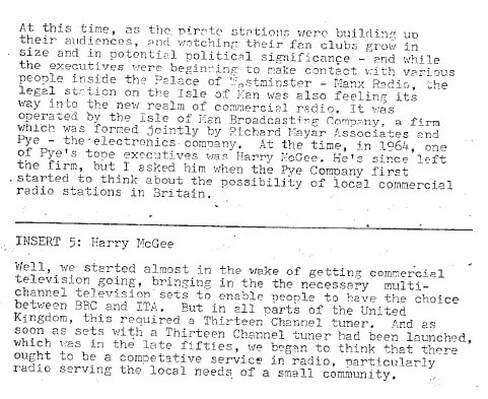 This interview featured several people, and Harry McGhee was one of the guests on the show. In this section of the interview, Dunkley begins by laying down a timeline which starts in the year 1964, after Manx Radio has come on the air. So the question is: When did Manx Radio first come on the air? It was on June 29, 1964, which was 94 days after the first test transmission by Radio Caroline off the coast of Essex on March 27, 1964. The radio ship mv Caroline then moved to a location off the Isle of Man on July 6, 1964, which was 7 days after Manx Radio first came on the air. Therefore since Harry McGee is referring to a time when Manx Radio is on the air, it has to be after June 29, 1964. 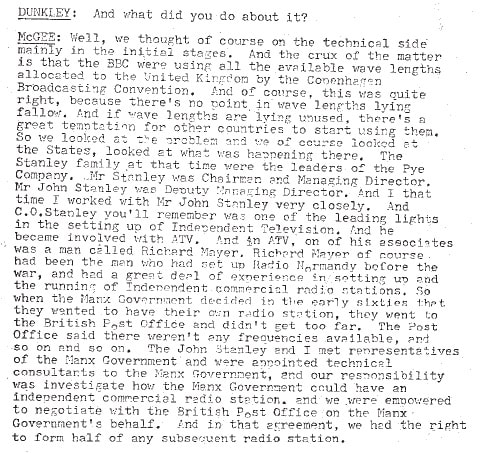 It is clear that Dunkley knew nothing about the claims later revealed in the book 'Radio Man', and it seems that although McGhee considered himself to be very close to John Stanley, he had no idea that both John Stanley and his father were working on both Manx Radio and Radio Caroline! Some of the recital by McGhee is similar to the paragraph on page 276 of 'Radio Man', but again, McGhee had limited knowledge about the actual involvement of Richard Meyer and how he tied into the Pye Plan to get licenses for radio stations all over the British Isles. 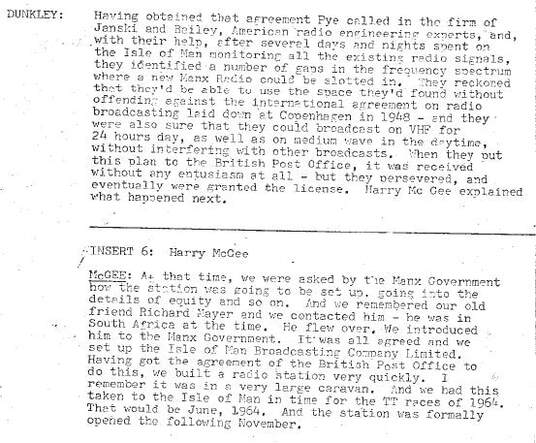 The reason why I am showing you the rest of McGhee's comments is in order to let him set the stage for what he thought that Charles and John Stanley were doing. In the press at the time, Pye began to complain loudly to the British (Tory) Government that they were allowing a 'pirate' station called Radio Caroline to destroy Manx Radio due to inequality of power being used by both stations. Clearly, to do this, Charles and John Stanley could not reveal that they had put Radio Caroline on the air, and clearly, to prevent 'leaks', very few people were aware of their masterplan. McGhee seems to have also been out of the 'loop'! 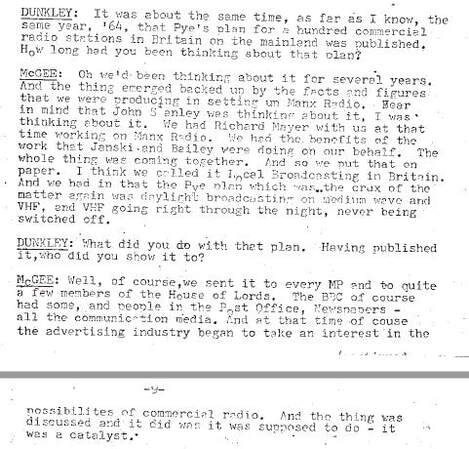 The Pye Plan was quite audacious! It was certainly devious! How many people in government guessed what the Stanleys were up to is another matter, but as you will see, and as Rusling noted in one of his stolen items of research, the Director General of the BBC came to know a lot of details, but even the BBC could not figure out the funding structure (and neither it seems can Paul Rusling!), because Pye had intentionally planted fake information in the Irish media about a future project that might involve Pye off the southeastern coastline of England. Nothing was reported about Pye being involved with getting Radio Caroline on the air beginning with its first test broadcast on March 27, 1964. 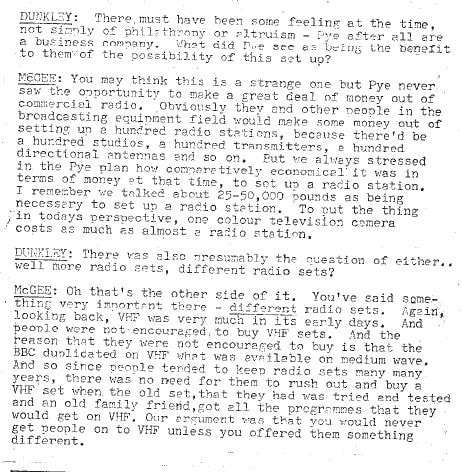 Now this part that McGhee is relating is true: Pye did not want to set up their own radio stations, even though they did build a demonstration station called 'Radio Cambridge'. The fact is that because of the deliberate scheme to deceive that had been set in motion by Pye, or rather, by Charles and John Stanley personally, and because Ronan O'Rahilly was hired at a much lower level to perpetuate one part of that deception, very few people knew what was really going on. But there was another wrinkle. 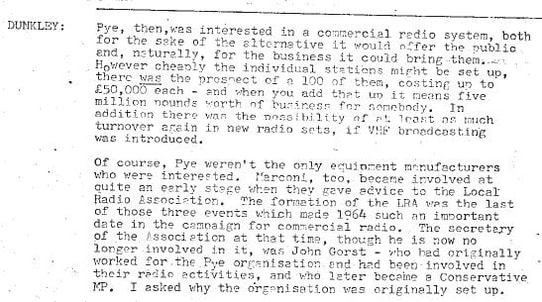 As previously explained, there were four 'lives' or parts to the life of the original Radio Caroline operation, and the first part lasted only until the General Election results came in on October 15, 1964, after which time the Pye involvement was over. But the break was not sudden, but gradual due to the people that Pye had introduced to run Radio Caroline from the start. Again, Rusling fails to grasp any of this. Labour had won the General Election of 1964, and rather than trying to introduce commercial radio in competition to the BBC, there was talk that the new Labour Government under Harold Wilson would be severely cutting back on the ITA commercial operations. However, none of this explains why 'Radio Man' included that one paragraph on page 276, because even at a first reading, it does not make sense, and it does not make sense because it clashes with known and proven facts established by many people. So why was it included? It seems that this was part of the plan to continue the confusion rather than explain the truth, and I will begin to unravel that devious element in Nicholas Stanley's book, tomorrow. See you then. [UPDATED BY EDITING TO INCLUDE AMENDMENTS, DELETIONS AND ADDITIONS: 4/3/2020 and another on 10/2/2020 adding 'h' to the name McGhee. The original is incorrect.] Comments are closed.
|
Our team produced this free radio program for PCRL in Birmingham.
It was repeatedly broadcast on and after October 20, 1985. Click & listen! Blog Archive
August 2023
Copyright 2021 with all rights reserved.
|
Index |
Library |
|
